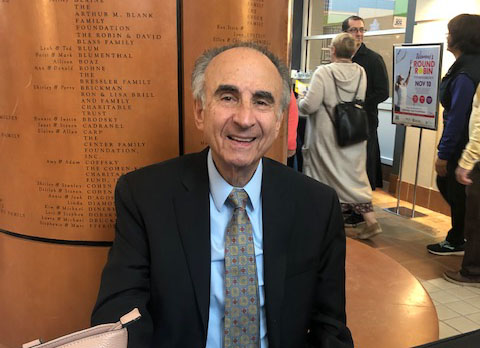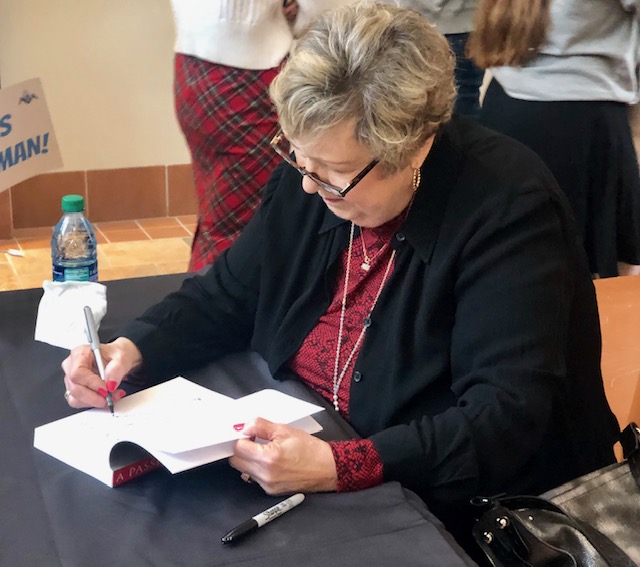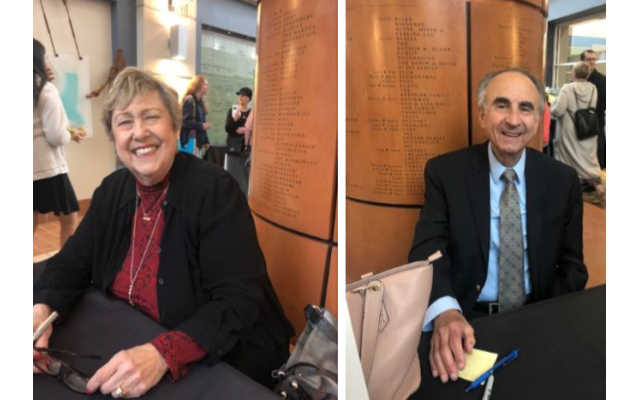Perry and Sherry on Their Powerful Histories
Perry Brickman and Sherry Frank shared a stage at the Book Festival of the MJCCA, discussing their books and the journeys that led them to write them.
Their first names rhyme and they both have a commitment to bringing about social change. Perry Brickman and Sherry Frank shared a stage Nov. 6 at the Book Festival of the MJCCA to speak about their new works of nonfiction, describing their personal battles to make a difference, rectify wrongs and break down barriers to equality.
They were interviewed by Gail Evans, former executive vice president of CNN and best-selling author.
Brickman used video interviews and footage from a 2012 documentary to help tell what went into the making of his book, “Extracted: Unmasking Rampant Antisemitism in American’s Higher Education.” The book and documentary detail his quest to uncover unfair treatment of Jewish students at Emory University Dental School in the 1950s.
A clip from the documentary, “From Silence to Recognition: Confronting Discrimination in Emory’s Dental School History,” included interviews with key players during Brickman’s 13 years of research to reveal how the dean of the dental school purposely ended the education of Jewish dental school students. Some of those students, now in their 80s, spoke on the video. One was in the audience, Brickman said.
Also captured was the 2012 public apology by Emory for the wrongs of the past.
What started his quest was seeing a chart by Emory professor Eric Goldstein in 2006 that showed that 65 percent of Jewish male students in the dental school between 1948 and 1961 had failed completely or repeated one or more years.
Dr. Ronald Goldstein recounted in the documentary how dean John Buhler questioned, “I don’t know why you Jews want to be dentists. You don’t have it in your hands.” Goldstein replied, “I treated the faculty. They must have thought my hands were good enough for them.”
The audience laughed when Brickman recalled how his children bought him a laptop for his 70th birthday 17 years ago, so he could write. “We used your credit card to buy it,” they told him.

After Brickman convinced the Emory administration what had happened, they asked, “’What do you want us to do?’” Brickman’s response: “That’s up to you. There was not enough money to pay us for what they did to us. … They apologized and we accepted it.”
He teared up talking about the public apology. “It was a great moment. It was really a great moment,” he said.
In the audience, Frank listened to Brickman tell how he and his fellow students kept their experience secret for years. “Such shame,” Frank could be heard murmuring. Later, she told her own longtime history of fighting anti-Semitism, building bridges within the black-Jewish communities, and helping Soviet and Ethiopian Jews resettle in Israel. It’s captured in her book, “A Passion to Serve: Memoirs of a Jewish Activist.”
Frank started by discussing cases of anti-Semitism she helped fight against at Agnes Scott College and Kennesaw State University.
When Evans asked her where her resilience comes from, Frank said, “I was 11 when my father died.” Later, she divorced with four children. She recalled how she went to work with her uncle Joe Zimmerman at Zimmerman’s men’s store downtown. “Daddy King preached his eulogy. He said Zimmerman’s was one of the few places African Americans could try on clothes.”
Frank followed in her uncle’s footsteps and drove African Americans to polls. In addition to starting the Black-Jewish Coalition, she maintained a long friendship with “Black-Jewish sisters,” including Johnnetta Cole, the first female African American president of Spelman College.
When the 9/11 tragedy struck and mosques were threatened, the Jewish community joined with Muslims to show Jews understood what it’s like to feel vulnerable. “When you feel others’ pain and have authentic relationships, we strengthen ourselves as Jews.”

Evans asked Frank whether she thought social media was a positive influence. She admitted misinformation spreads, but “I wouldn’t want to be without social media.” When the Pittsburgh shooting occurred last year, Jews and non-Jews worldwide knew through social media to #ShowUpForShabbat. “With a 24/7 news cycle, we would have known about the Holocaust.”
Frank’s latest activism is helping revitalize the National Council of Jewish Women, which is about to celebrate its 100-year anniversary. She became its president for the second time recently and has been leading monthly luncheons on current events. That’s 13 years after she planned to retire and spend more time with her 11 grandchildren. It’s hard to take a back seat when you’re an activist and there’s a need to fill.




comments